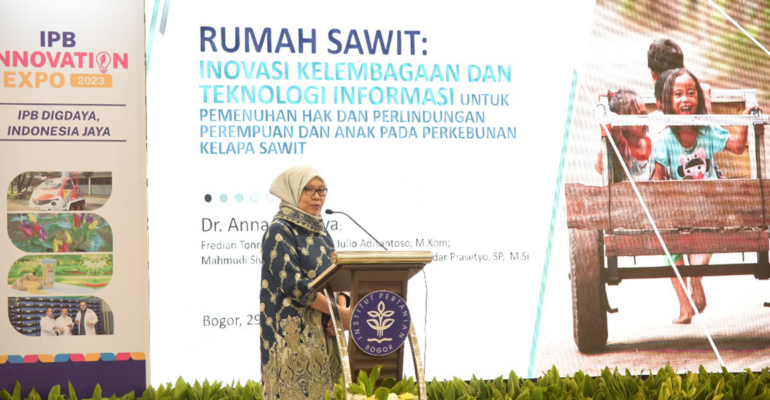IPB University Launches Rumah Sawit Innovation, Integrated Services for Palm Oil Plantation Communities

At the IPB Innovation Expo and Social Action Research Launching event (29/9), IPB University launched ‘Rumah Sawit’ as one of the social innovations. This innovation pioneered by the Center for Gender and Child Studies (PKGA) of IPB University has been implemented in three provinces: Lampung, Central Kalimantan and North Sumatra.
Dr Anna Fatchiya, the chairperson of the research team, said that the background of this social action research was carried out because of the issue that development in the oil palm plantation sector has left women and children groups behind, namely by not fulfilling their rights in the health, education, and economic or employment sectors. In fact, on the one hand, women have an important role as an entry point to achieving the Sustainable Development Goals (SDGs).
“Rumah Sawit’ is an integrated service place for the community as a medium for advocacy, training, education, and health for women and children. This institutional innovation is expected to become a forum for communities around oil palm plantations, especially in the process of community empowerment and the fulfillment of women’s and children’s rights,” she said.
The PKGA IPB University research team consists of Dr Anna Fatchiya; Ir Fredian Tonny Nasdian, MS; Ir Julio Adosantoso, MS; Mahmudi Siwi, SP, MSi; Asri Sulistiawati, SKPm, MSi; and Kunandar Prasetyo, SP MSi. The research was conducted with funding from the Oil Palm Plantation Fund Management Agency (BPDPKS).
Dr Anna explained that the practices of Rumah Sawit as an integrated service center have been implemented in Sidorejo Village in Lampung, Timbang Lawan Village in North Sumatra, and Belawan Mulia Village in Central Kalimantan. The implementation of the ‘Rumah Sawit’ model in these three places has proven to have a positive impact. She concluded that this model can certainly be developed in other villages.
One of the community leaders of Sidorejo Village, Winarno revealed, “With the construction of ‘Rumah Sawit’ from IPB University, our women farmer group (KWT) has come back to life. They are active in utilizing the yard land by planting with IPB University seeds. The Posyandu and PAUD cadres have also become more enthusiastic.”
Post-research villagers’ activities even continue to grow. Evidenced by the increase in activities, namely social services, arisan, and savings and loans. As of March 2023, the value of savings and loans reached 16.8 million rupiah and savings fund of 7.5 million rupiah. In addition, there was an initiation of social fund collected voluntarily at each meeting. Women’s interest in becoming group members has also increased rapidly, so it is planned to increase the number of groups.
In addition to institutional innovation, Dr Anna added, this innovation is also available in the form of an application, ‘the Rumah Sawit’ App. This tool can be used by the wider community in the form of information and consultation services. This application contains the latest news and information about palm oil in Indonesia, IPB University expert consultation services and services to report incidents of violence and rights violations in women and children.
“The Rumah Sawit’ application was developed based on web and android so that the application can be accessed by smart phones by many people. The Rumah Sawit application can also be utilized by people outside oil palm plantations. For example, for consultations on food agriculture and horticulture, fisheries, animal husbandry and forestry from IPB University experts,” she said.
The reporting feature on violence against children and women can also be used by the general public outside oil palm plantations. This feature is in collaboration with the Office of Women’s Empowerment and Child Protection and the local Integrated Service Center for Women and Children Empowerment (P2TP2A). (*/Rz) (IAAS/SHY)



